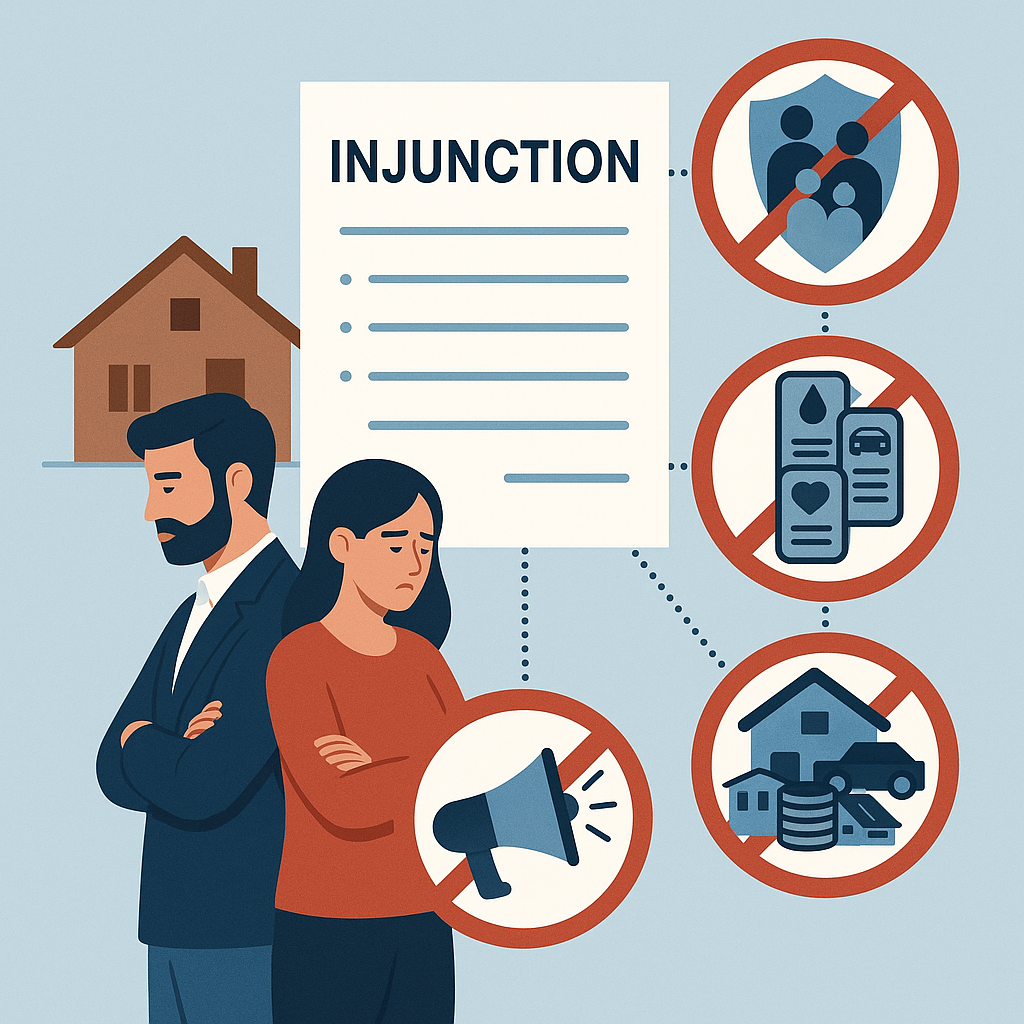What Is the Utah Domestic Relations Injunction?
Plain-English guide to Rule 109, when it starts, what it prohibits, and what to do if it is violated
When you file for divorce or separation in Utah, a court order automatically kicks in without anyone needing to request it. It is called the Utah Domestic Relations Injunction, and it is designed to keep both spouses from taking harmful or impulsive actions while the case is pending. Bottom line up front: filing a divorce triggers an automatic injunction that tells both parties what they can and cannot do until the case is resolved.
Understanding this order matters. It affects how you handle property, finances, communication, and even insurance coverage while your case is pending. Violating it can have serious consequences, including contempt of court penalties.
When It Takes Effect
The injunction begins the moment a divorce petition is filed with the court. For the petitioner, it takes effect immediately. For the respondent, it becomes effective as soon as they are formally served with the divorce papers and a copy of the injunction.
This means timing matters. If you have not yet served your spouse, the injunction does not apply to them. Once service is complete, both parties must follow it equally.
What You Can and Cannot Do
Utah’s Domestic Relations Injunction, found in Utah Rule of Civil Procedure 109, sets clear boundaries. It typically prohibits the following:
- Property and finances. Neither party can sell, transfer, hide, or damage marital property. This includes vehicles, bank accounts, and homes.
- Insurance. You cannot cancel or alter health, auto, or life insurance policies covering either spouse or the children.
- Harassment and intimidation. You must not harass, threaten, or disturb your spouse’s peace.
- Children. Neither parent can move the children out of state or interfere with parenting time unless the court allows it.
In short, the injunction keeps things stable so both parties can focus on resolving the divorce fairly.
Serving Your Spouse Properly
If you filed for divorce, you are responsible for ensuring the other party is served with the correct documents. The injunction only applies to them after they receive notice. Proper service usually means a process server or sheriff hand delivers the papers, or another approved legal method is used.
Skipping this step or serving incorrectly could delay enforcement and even affect your case later. Always check that the injunction form is included in your service packet. Utah courts provide this automatically.
Violations and Court Remedies
If someone violates the injunction, the court can act quickly. Common consequences include:
- Contempt of court charges
- Attorney’s fees for the other party
- Orders restoring property or reversing transactions
Judges take these injunctions seriously because they preserve fairness and order while the divorce moves forward. Documenting every violation, including dates, actions, and proof, helps the court decide the right remedy.
Interaction with Protective Orders
The domestic relations injunction is not the same as a protective order. A protective order focuses on personal safety and can include no contact rules. The injunction focuses on financial and behavioral limits during the divorce.
Both can exist at the same time. For instance, if there is domestic violence or threats, a protective order offers stronger, immediate protections while the injunction manages broader divorce conduct.
Practical Tips
- Treat the injunction like a standing rule. Do not test its limits.
- Track joint accounts and property status as soon as the case begins.
- If something changes, such as insurance or a property sale, ask the court first.
- Communicate only as necessary and respectfully, especially when children are involved.
Video & Social Learning Hub
YouTube: Utah Rule 109 and Related Topics
Instagram: Real Utah Divorce and Custody Stories
Need Help Applying This to Your Situation?
Utah’s domestic relations injunction might seem automatic, but understanding its rules can prevent serious missteps. It protects both parties and the process itself by setting boundaries until your divorce or separation is finalized.
Talk to a Utah AttorneyIf you are filing or responding to a divorce, download Utah’s injunction handout or talk to a Utah attorney for specific advice on how it applies to your case. For more plain-English legal guidance, stay updated with Utah Law Explained, explore our mission on the About Us page, or connect with trusted counsel like Gibb Law Firm.
